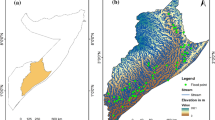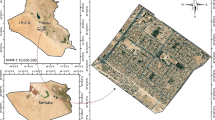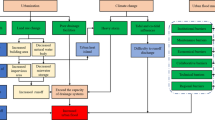Abstract
Estimation of the magnitude of designed flood is a fundamental task crucial for the determination of scale of engineering construction and for the development of flood disaster risk management projects. Due to a high level of uncertainty in observed data, selection of frequency distribution model, and estimation of model parameters, the process of designed flood has uncertainties consequently. A Bayesian flood frequency analysis method is adopted for designed flood estimation with P-III probability distribution as its flood frequency model. In the Bayesian method, the adaptive metropolis Markov Chain Monte Carlo (AM-MCMC) sampling algorithm is employed to estimate posterior distributions of parameters, upon which estimation of expectations and credible intervals of designed floods is obtained. With analyzing the drawback of likelihood function expressed with the product of probability of occurrence of each sample individual, four likelihood functions expressed on residuals are presented, and then based on Bayesian AM-MCMC method, performance of presented likelihood functions is compared with that of the classical likelihood function, with taking peak flow uncertainty analysis of Panjiakou Reservoir as a case study. The results show that expectations of flood peak quantiles estimation with likelihood functions based on residuals between observed/censored and calculated values of flood peaks are almost the same, but there are obvious differences between likelihood function based on occurrence probability of flood sample and those based on residuals with respect to expectation of quantiles estimation and also show that expectation and credible interval of quantiles estimation with Bayesian AM-MCMC method based on the whole likelihood function are more reasonable than those acquired with maximum likelihood function. Finally, some relevant flood frequency analyses issues based on Bayesian AM-MCMC algorithm which need to be further studied are also presented.






Similar content being viewed by others
References
Chu PS, Zhao X (2011) Bayesian analysis for extreme climatic events: a review. Atmos Res 102(3):243–262. https://doi.org/10.1016/j.atmosres.2011.07.001
Gaume E, Gaál L, Viglione A, Szolgay J, Kohnová S, Blöschl G (2010) Bayesian MCMC approach to regional flood frequency analyses involving extraordinary flood events at ungauged sites. J Hydrol 394(1–2):101–117. https://doi.org/10.1016/j.jhydrol.2010.01.008
Gelman A, Rubin DB (1992) Inference from iterative simulation using multiple sequences. Statist Sci 7(4):457–472. https://doi.org/10.1214/ss/1177011136
Geman S, Geman D (1984) Stochastic relaxation, Gibbs distributions and the bayesian restoration of images. IEEE Pattern A 6:721–741. https://doi.org/10.1109/TPAMI.1984.4767596
Haario H, Saksman E, Tamminen J (2001) An adaptive metropolis algorithm. Bernoulli 7(2):223–242. https://doi.org/10.2307/3318737
Hao YH, Huo XL, Duan QY, Youcun Liu, Yonghui Fan, Yan Liu, Yeh TCJ (2015) A Bayesian analysis of nonstationary generalized extreme value distribution of annual spring discharge minima. Environ Earth Sci 73(5):2031–2045. https://doi.org/10.1007/s12665-014-3552-7
Hastings WK (1970) Monte Carlo sampling methods using markov chains and their applications. Biometrika 57:97–109
Jin GY (2011) Further discussion on problems from calculation on frequency of flood series containing extraordinary event. Water Resour Hydropower Eng 42(8):75–77 (in Chinese)
Joseph JF, Guillaume JHA (2013) Using a parallelized MCMC algorithm in R to identify appropriate likelihood functions for SWAT. Environ Model Softw 46:292–298. https://doi.org/10.1016/j.envsoft.2013.03.012
Kansoa A, Chebbo G, Tassin B (2006) Application of MCMC–GSA model calibration method to urban runoff quality modeling. Reliab Eng Syst Saf 91(10–11):1398–1405. https://doi.org/10.1016/j.ress.2005.11.051
Liang ZM, Li BQ, Yu ZB, Chang WJ (2011) Application of Bayesian approach to hydrological frequency analysis. Sci China Technol Sci 54:1183–1192. https://doi.org/10.1007/s11431-010-4229-4
Liang Z, Chang W, Li B (2012) Bayesian flood frequency analysis in the light of model and parameter uncertainties. Stoch Environ Res Risk Assess 26(5):721–730. https://doi.org/10.1007/s00477-011-0552-y
Lin KR, Zhang Q, Chen XH (2010) An evaluation of impacts of DEM resolution and parameter correlation on TOPMODEL modeling uncertainty. J Hydrol 394(3–4):370–383. https://doi.org/10.1016/j.jhydrol.2010.09.012
Lin KR, Lian YQ, He YH (2014) Effect of baseflow separation on uncertainty of hydrological modeling in the Xinanjiang model. Math Probl Eng 8:1–9. https://doi.org/10.1155/2014/985054
Nikoo MR, Kerachian R, Karimi A, Azadnia AA, Jafarzadegan K (2014) Optimal water and waste load allocation in reservoir-river systems: a case study. Environ Earth Sci 71:4127–4142. https://doi.org/10.1007/s12665-013-2801-5
Pérez CJ, Martín J, Rufo MJ (2006a) MCMC-based local parametric sensitivity estimations. Comput St D 51(2):823–835. https://doi.org/10.1016/j.csda.2005.09.005
Pérez CJ, Martín J, Rufo MJ (2006b) Sensitivity estimations for Bayesian inference models solved by MCMC methods. Reliab Eng Syst Saf 91(10–11):1310–1314. https://doi.org/10.1016/j.ress.2005.11.029
Pluntke T, Pavlik D, Bernhofer C (2014) Reducing uncertainty in hydrological modelling in a data sparse region. Environ Earth Sci 72(12):4801–4816. https://doi.org/10.1007/s12665-014-3252-3
Reis DS, Stedinger JR (2005) Bayesian MCMC flood frequency analysis with historical information. J Hydrol 313(1–2):97–116. https://doi.org/10.1016/j.jhydrol.2005.02.028
Shojaei M, Nazif S, Kerachian R (2015) Joint uncertainty analysis in river water quality simulation: a case study of the Karoon River in Iran. Environ Earth Sci 73(7):3819–3831. https://doi.org/10.1007/s12665-014-3667-x
Vrugt JA, Gupta HV, Bouten W, Sorooshian S (2003) A shuffled complex evolution metropolis algorithm for optimization and uncertainty assessment of hydrologic model parameters. Water Resour Res 39(8):1201. https://doi.org/10.1029/2002WR001642
Vrugt JA, ter Braak CJF, Diks CGH, Robinson BA, Hyman JM, Higdon D (2009) Accelerating Markov Chain Monte Carlo simulation by differential evolution with self-adaptive randomized subspace sampling. Int J Nonlinear Sci Numer Simul 10(3):273–290. https://doi.org/10.1515/ijnsns.2009.10.3.273
Xing ZX, Rui XF, Feng J (2010) Probabilistic flood forecast based on AM-MCMC and Nash Model. J Wuhan Univ Technol (TSE) 34(6):1275–1279. https://doi.org/10.3963/j.issn.1006-2823.2010.06.000 (in Chinese)
Xing ZX, Rui XF, Fu Q, Ji Y, Zhu SJ (2011) Nash model parameter uncertainty analysis by AM-MCMC based on BFS and probabilistic flood forecasting. Chin Geogr Sci 21(1):74–83. https://doi.org/10.1007/s11769-010-0433-1
Zhao TTG, Wang QJ, Bennett JC, Robertson DE, Shao QX, Zhao JS (2015) Quantifying predictive uncertainty of streamflow forecasts based on a Bayesian joint probability model. J Hydrol 528:329–340. https://doi.org/10.1016/j.jhydrol.2015.06.043
Zhou YL, Lu GH, Jin JL, Zhang LB (2009) Study on genetic algorithm of changeable structure and its application to the lag time of Watershed. WRI Global Congress on Intelligent Systems, IEEE Computer Society 2:79–83. https://doi.org/10.1109/GCIS.2009.273
Acknowledgements
The study is financially supported by the National Key Research and Development Program of China under Grant Nos. 2016YFC0401303 and 2016YFC0401305; National Natural Science Foundation of China under Nos. 51579060, 51509065, 51779067 and 51579059; Open Foundation of State Key Laboratory of Hydrology-Water Resources and Hydraulic Engineering under No. 2013491011.
Author information
Authors and Affiliations
Corresponding author
Additional information
This article is a part of a Topical Collection in Environmental Earth Sciences on Climate Effects on Water Resources, edited by Drs. Zongzhi Wang and Yanqing Lian.
Rights and permissions
About this article
Cite this article
Zhou, Y., Wang, Z., Jin, J. et al. Uncertainty analysis of designed flood on Bayesian MCMC algorithm: a case study of the Panjiakou Reservoir in China. Environ Earth Sci 76, 788 (2017). https://doi.org/10.1007/s12665-017-7087-6
Received:
Accepted:
Published:
DOI: https://doi.org/10.1007/s12665-017-7087-6




